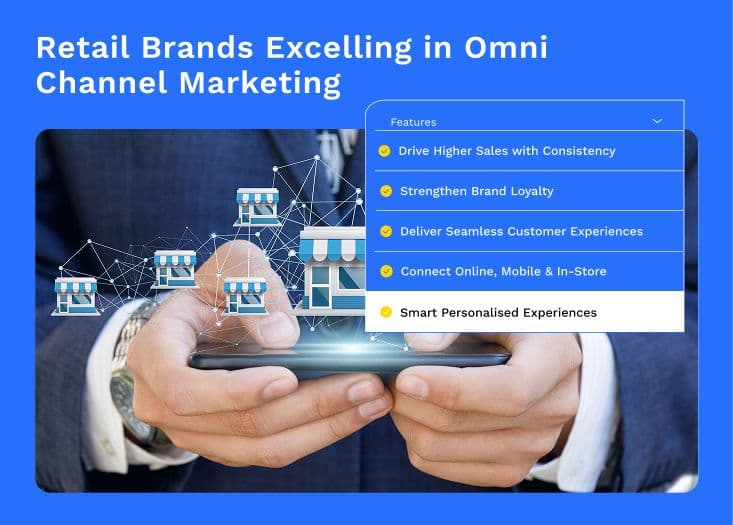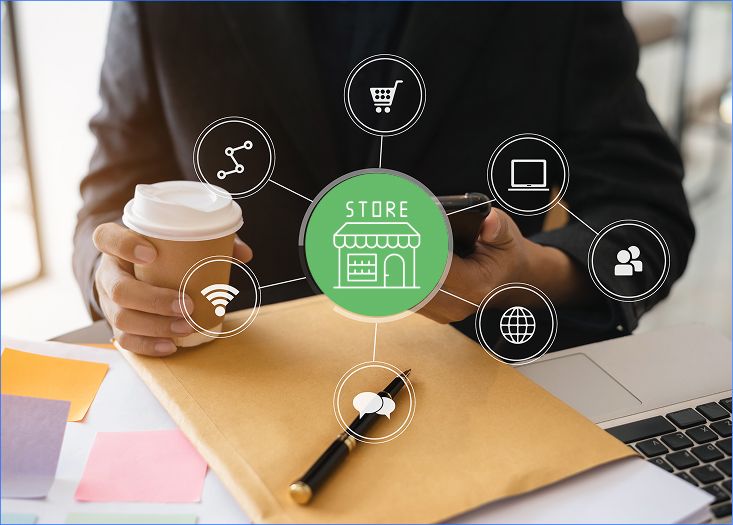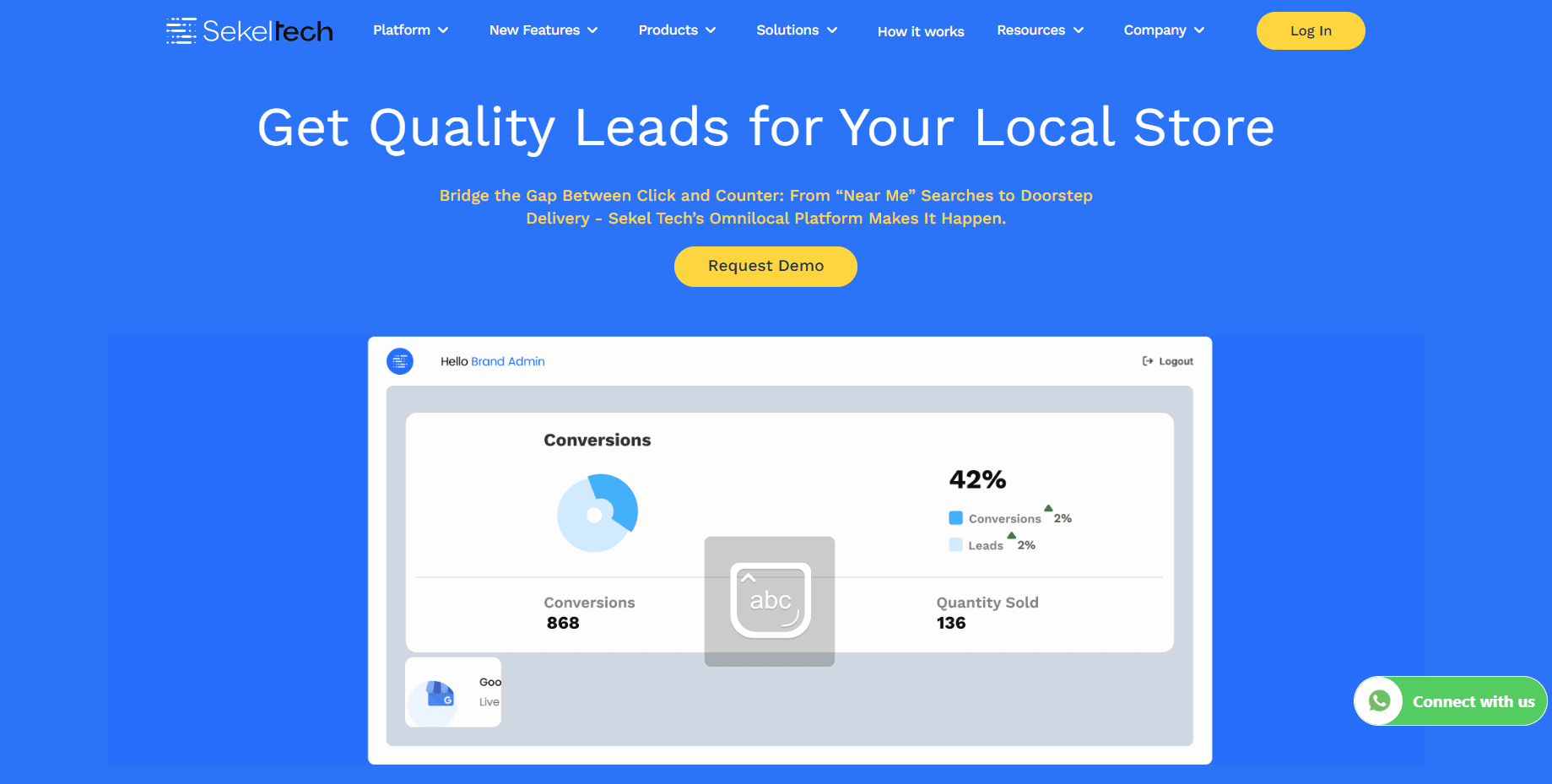Omni Channel
Top 15 Retail Brands Excelling in Omni Channel Marketing
Thu, 22 Aug 2024 12:42:50 GMT
Speak to our Hyperlocal Expert

Editor’s Note: This post was originally published in July 2023 and is updated in Dec 2025 for accuracy and comprehensiveness.
Omni channel marketing is a key method that ensures a consistent and seamless customer experience across all touchpoints including physical stores, online platforms, mobile apps, social media, and offline channels like company events or brick-and-mortar locations.
Omni-channel marketing is crucial for modern businesses as it provides a streamlined and consistent customer experience across all touchpoints. By integrating various channels, businesses can meet customers where they are, increase brand loyalty, and drive sales. Additionally, omni channel marketing allows for personalised experiences, enabling businesses to customise their offerings to individual customer preferences and needs. This ultimately leads to higher customer satisfaction and improved business outcomes.
In this article, we discover the top 15 retail brands excelling in Omni channel marketing and learn key strategies for achieving success with your own omnichannel approach. Explore our comprehensive guide to establish the benchmark and get actionable tips to enhance your marketing efforts.
What is Omni Channel Marketing and Its Benefits?

Omni channel Marketing is a strategic approach that delivers a smooth and uniform customer experience across various channels, including physical stores, online platforms, mobile apps, and social media. This strategy guarantees that customers encounter a cohesive brand experience, no matter how they engage with the brand. By integrating all channels, businesses can provide a unified and effective customer journey.
Benefits of Omni-Channel Marketing
- Enhanced Customer Experience
Omni-channel marketing creates a seamless and personalised journey across online and offline touchpoints. This improves customer satisfaction, builds trust, and boosts long-term loyalty.
- Higher Sales & Conversions
By engaging customers on their preferred channels and offering a consistent brand experience, businesses see stronger conversions, increased sales, and more repeat purchases.
- Stronger Brand Loyalty
A unified experience across websites, apps, stores, and social platforms improves brand recall. Customers tend to stay loyal to brands that deliver consistent value everywhere.
- Better Customer Data & Insights
Omni-channel strategies collect data from multiple touchpoints, helping brands understand user behaviour, intent, and preferences. This leads to sharper targeting and more effective campaigns.
- Greater Agility & Flexibility
With an omni-channel approach, businesses can quickly adapt to changing customer needs, market trends, and competitive shifts - ensuring relevance and timely engagement.
Omni-Channel Marketing Examples
1. Retail
Customers can browse products online, check availability, order for home delivery, or opt for in-store pickup. Brands can also sync inventory, run personalised offers, and create unified shopping experiences across web, app, and stores.
2. Hospitality
Hotels offer online check-in, digital room keys, mobile food ordering, and virtual property tours. This creates a smooth, contactless, and convenient guest experience.
3. Automotive
Buyers can research cars online, book test drives, customise vehicles in virtual showrooms, and manage maintenance through mobile apps. This shortens the purchase journey and improves engagement.
4. Financial Services
Customers can open accounts online, manage banking via apps, make payments, and receive personalised financial recommendations through data-driven insights.
These examples demonstrate how businesses can utilise omni-channel marketing to create a seamless and personalised customer experience across all touchpoints.
Enhance your understanding with this informative video. Discover how Sekel Tech’s hyperlocal solutions are overcoming challenges in integrating online and offline retail experiences.
Key Differences Between Multichannel and Omni channel Marketing
Aspect | Multichannel Marketing | Omni channel Marketing |
| Customer Experience | Channels work independently, often creating inconsistent interactions. | All channels connect to deliver a seamless, unified customer journey. |
| Channel Integration | Minimal integration; each channel operates in a silo. | High integration with shared data across all touchpoints. |
| Personalisation | Basic, channel-specific personalisation. | Deep, data-driven personalisation across every channel. |
| Brand Consistency | Messaging may vary from channel to channel. | Consistent branding, offers, and communication everywhere. |
| Customer Journey | Disconnected journey; customers repeat steps when switching platforms. | Smooth, continuous journey across online and offline channels. |
| Best For | Brands focused on reach rather than experience. | Brands aiming for high customer loyalty, retention, and seamless experience. |
Why is Omni Channel Marketing Important to Brands?

Omni channel marketing is essential for brands because it offers a cohesive and unified customer experience across all platforms. By ensuring consistency in messaging and branding across various channels, brands can foster trust, loyalty, and a strong brand identity. An integrated omnichannel strategy allows for tailored messaging ensuring that customers receive relevant information regardless of their preferred channel.
Moreover, omni channel marketing enables brands to meet customers where they are, enhancing engagement and driving sales. Personalisation is a key benefit, allowing brands to customise their offerings to individual customer preferences and needs. This not only improves customer satisfaction but also leads to better business outcomes. An omnichannel approach ensures a consistent brand presence and messaging across all marketing channels, contributing to a more positive customer experience and ultimately, increased conversions.
Find out how brands can regain customer trust and drive conversions in physical stores through effective omnichannel strategies with this informative video on "How Can You Regain Trust and Drive Conversions in Your Physical Stores?"
Top 15 Retail Brands Excelling in Omni Channel Marketing
Omni channel marketing is crucial for brands to create a seamless and consistent experience across various customer touch points. Below is a list of the top 15 retail brands that are excelling in this approach, successfully integrating their online and offline channels to deliver personalised and cohesive customer journeys.
1. Sekel Tech

Sekel Tech is a leader in hyperlocal and omni channel marketing, offering a powerful platform that connects brands with local customers. Sekel’s SellrApp enables seamless integration of leads, dealers, inventory, and customer data, driving enhanced discovery and engagement. Sekel Tech’s platform leverages CRM, marketplace integration, ePOS systems, Store2Door Omni-Commerce, and review management tools to deliver personalised experiences across all channels. With features like Buy Online, Pickup In-Store(BOPIS) integrated through Store2Door, Sekel Tech ensures a cohesive online and offline customer experience.
2. HubSpot
HubSpot's omni-channel marketing solutions are highly regarded for their ability to integrate various customer touch points. By leveraging CRM, marketing automation, and content management tools, HubSpot enables brands to deliver personalised experiences across all channels.
3. Apple
Apple excels in creating a unified shopping experience across its digital and physical stores. Whether online, in-store, or via the Apple Store app, customers receive consistent service and product offerings, ensuring a seamless experience.
4. Amazon
Amazon’s omni-channel prowess is evident in its seamless integration of online shopping with physical stores like Amazon Go and Whole Foods. Their extensive use of customer data enables personalised recommendations and consistent experiences across all platforms.
5. Oracle
Oracle provides comprehensive omni-channel solutions that help brands streamline their customer interactions. Their platform integrates sales, marketing, and service channels, enabling brands to deliver a consistent and personalised customer experience.
6. Omnisend
Omnisend specialises in omni-channel marketing automation, particularly for eCommerce brands. Their platform integrates email, SMS, and social media channels, allowing businesses to create cohesive campaigns that reach customers wherever they are.
7. WebEngage
WebEngage's omni-channel marketing platform offers advanced customer segmentation and personalised engagement across email, SMS, mobile push, and web push notifications. This ensures a connected experience for users across all digital touchpoints.
8. Emarsys
Emarsys provides a robust omni-channel marketing platform that helps brands deliver personalised, real-time interactions across all channels, including email, mobile, social media, and more, enhancing customer engagement and loyalty.
9. Marketing Evolution
Marketing Evolution uses AI and data-driven insights to optimise omni-channel marketing strategies. Their platform enables brands to deliver personalised experiences at scale, ensuring that customers receive consistent messaging across all channels.
10. Mailchimp
Mailchimp has evolved from an email marketing service to a comprehensive omni-channel marketing platform. It now includes features like social media management, landing pages, and digital ads, helping brands maintain a consistent presence across channels.
11. Starbucks
Starbucks is a prime example of omni-channel success, with its mobile app linking seamlessly with in-store experiences. Customers can order ahead, pay through the app, and earn rewards, creating a unified and convenient customer journey.
12. Walmart
Walmart has successfully integrated its online and physical stores, offering services like "Buy Online, Pickup In-Store" (BOPIS) and home delivery. Their app also enhances the in-store experience, making shopping more efficient and personalised.
13. Adidas
Adidas combines digital and physical experiences by offering customers the ability to shop online, use the app for in-store navigation, and choose in-store pickup options. Their omni-channel strategy ensures a seamless shopping experience.
14. IKEA
IKEA offers a consistent omni-channel experience through its website, app, and physical stores. Customers can browse online, check in-store availability, and choose between home delivery or in-store pickup, ensuring convenience and flexibility.
15. Sephora
Sephora excels in blending its online and offline experiences. Features like the "Virtual Artist" app allow customers to try on makeup virtually and then purchase online or in-store, ensuring a personalised and seamless shopping journey.
These 15 retail brands are setting the standard for omni channel marketing, demonstrating how integrating online and offline channels can lead to increased customer satisfaction, loyalty, and sales. By studying their strategies, other brands can learn how to enhance their own omni-channel efforts and deliver a superior customer experience.
Explore how hyper-local marketing can boost sales for physical stores and learn from the top retail brands excelling in this approach. Watch this quick video for a better understanding on "Is Hyper-Local Marketing the Key to Boosting Sales for Physical Stores?"
Omni-Channel Marketing Best Practices for Success
Understand Your Customer Journey
Start by mapping how customers interact with your brand across every touchpoint. A clear journey map helps you design smooth transitions between channels and strengthens your omni channel marketing experience from start to finish.
Define Your Omnichannel Goals
Before building your omni channel retail strategy, define clear goals based on your business objectives and audience needs. This ensures your omni-channel marketing efforts stay focused and deliver meaningful results.
Invest in the Right Technology
Technology is essential for success in omni-channel marketing. Invest in strong platforms that support multi-channel integration, including CRM tools, local marketing automation software, and data analytics systems. These tools offer real-time analytics and help manage customer experiences across all channels.
Personalise the Customer Experience
Use customer data from loyalty programs, purchase history, and in-store interactions to create personalised recommendations and targeted Digital campaigns. Personalisation makes your omni channel marketing more engaging and customer centric.
Measure and Analyse Performance
Track key performance metrics such as traffic, conversions, customer satisfaction, and ROI. Analysing this data helps optimise your omni-channel marketing approach and identify areas that need improvement.
Continuously Adapt and Evolve
Customer expectations change quickly. Stay updated on new trends and adjust your omni channel marketing strategy regularly to keep your brand relevant and competitive.
Read also - A Roadmap to Retail Brand Growth with Omni Channel Sales
How to Choose the Right Omni Channel Marketing Platform for Your Retail Brand
Choosing the right omni channel marketing platform is critical for delivering a seamless and consistent customer experience across all touchpoints. The right solution helps your retail brand integrate channels, personalise interactions, and drive better business results.
- Prioritise Easy Integration
Choose an omni channel marketing platform that connects smoothly with your CRM, eCommerce, and inventory tools. Strong data integration ensures all channels work together, delivering a seamless retail experience.
- Look for Customisation and Scalability
Select a platform that adapts to your retail brand’s needs. Customise workflows, integrate third-party apps, and scale easily as your omni-channel marketing efforts grow across stores and digital touchpoints.
- Evaluate Data Management Strength
The platform should handle customer data efficiently. Collect and analyse insights from all channels to personalise marketing and improve decisions, while supporting secure storage and reliable performance.
- Check Security and Compliance
Ensure the platform protects customer data with encryption, safe storage, and regular updates. Strong Security and Compliance safeguards your brand reputation and builds trust.
- Assess Support and Training
Opt for a provider offering onboarding, training, and responsive support, helping your team maximise the platform’s potential.
Read Also - 15 Best Omni Channel Retail Strategies to Implement in 2025
To delve deeper into how omni-channel marketing is driving growth for modern-day brands, check out the insightful article by the Times of India: Omnichannel Marketing: The Innovative Approach Driving Growth for Modern-Day Brands.
Top Omni channel Marketing Trends Shaping the Future
The world of omni channel marketing is evolving fast, pushing brands to innovate and deliver seamless, personalised experiences across online and offline touchpoints. Keeping up with these trends is key to staying competitive.
1. Hyper-Personalisation
Brands are leveraging customer data to create tailored experiences. Tools like Sekel’s Customer Data Platform help deliver relevant interactions that boost engagement and loyalty.
2. Unified Commerce Platforms
Integrating digital and physical channels ensures a consistent experience. Solutions like SellrApp and Store Microsites allow smooth navigation across all touchpoints.
3. AI-Driven Insights
Artificial intelligence supports smarter marketing decisions. Sekel Agentic AI helps optimise campaigns and customer journeys efficiently.
4. Voice and Conversational Commerce
Voice assistants and chatbots are becoming essential for personalised support. Sekel’s AI ChatBot enables instant, intelligent customer interactions across channels.
5. Data-Driven Customer Experiences
Brands are increasingly relying on insights to refine campaigns and improve engagement. Leveraging analytics from integrated platforms ensures decisions are informed and impactful.
Embracing these trends helps businesses enhance their omni channel marketing, deliver superior customer experiences, and drive sustainable growth.
Read Also - Hyperlocal & Omni Channel Marketing: Trends and Strategies
Frequently Asked Questions (FAQs)
1. What is the main advantage of omni channel marketing?
Multichannel marketing engages customers through various independent channels, often without a unified strategy. Omni channel marketing, on the other hand, connects all channels to deliver a seamless and consistent experience across every customer interaction.
2. What is omni channel strategy?
An omnichannel strategy integrates online and offline interactions to provide a consistent and seamless customer experience. This approach strengthens customer loyalty by ensuring personalised and cohesive engagement across all touchpoints.
3. Why is omnichannel successful?
Omni channel marketing excels by ensuring a smooth and unified experience across all customer interactions, which enhances engagement and satisfaction. This approach enables personalised communication and helps build strong customer relationships, leading to increased loyalty and sales.
4. What are the types of omni-channel?
Omnichannel strategies involve combining various channels, including online platforms, physical stores, mobile apps, and social media, to deliver a unified and personalised customer experience across all touchpoints.
5. What is the core principle of omni-channel marketing?
The core principle of omni-channel marketing is to offer a connected and seamless experience across all customer contact points. This ensures that messaging and interactions are consistent and personalised, boosting overall customer satisfaction and engagement.
Conclusion
Mastering omni-channel marketing is crucial for delivering a seamless and engaging customer experience that drives loyalty and sales. By integrating online and offline touchpoints effectively, businesses can enhance their brand presence and create a cohesive journey for their customers. The top 15 retail brands showcased here exemplify the transformative power of a well-executed omni channel strategy, setting a benchmark for success in today’s competitive market.
Take the Advantages of Sekel Tech's Omni Channel Marketing Platform
Unlock the full potential of your marketing strategy with Sekel Tech’s Omni-Channel Marketing Platform. Our cutting-edge solutions offer seamless integration, personalised customer experiences, and actionable insights to drive your success. Don’t miss out—contact us today to transform your marketing approach and elevate your brand to new heights with Sekel Tech.
Share
Similar Blogs
Loved this content?
Sign up for our newsletter and get the latest tips & updates directly in your inbox.
There’s more where that came from!